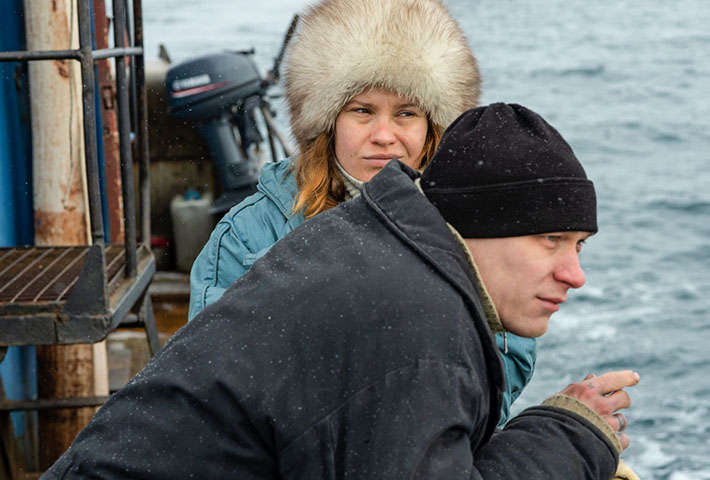
- Golden Globe Awards
Compartment Number 6 (Finland, Russia, Estonia, Germany)
The end of the 90s, a party in a big Altbau apartment in Moscow. It is full of intellectuals who are enjoying not only food and drinks but also academic parlor games. Although she feels a little out of place and is finding it difficult to keep up with the games, Laura (played by Finnish actress Seidi Haarla), a young Finnish woman who is studying Russian, would like to freeze this moment in time. She is in love with Irina, a young Russian professor, and cannot take her eyes off her. The two have planned a trip up to the Arctic Circle, to see the newly discovered prehistoric rock carvings or petroglyphs. But it turns out that Irina’s plans have changed at the last minute. Laura leaves the happy gathering in the bohemian Moscow apartment in order to travel alone to Murmansk by train, on which she will share a claustrophobic compartment with a crude-mannered young working-class man named Ljoha (Yuriy Borisov).
The drama Compartment No.6, co-written and directed by Juho Kuosmanen, is based on the book of the same name by Rosa Liksom, who describes in it a real-life experience that happened to her during a trip on the Trans-Siberian Railway in the 80s. Focusing on the relationship between the two main characters, Finnish director Kuosmanen has slightly changed, not only the time and place of the story but also the character of Ljoha by making him younger.
Believing that the casting was the most important decision to be made, Kuosmanen invited Borisov to meet Haarla, which, for him, completely changed the dynamic of the relationship between the two strangers. “After seeing Yuri and Seidi together, I realized that it’s actually the story of two soulmates, a story of two very similar kinds of characters who are dealing with these social roles – class roles or whatever that they are hiding behind – which are the reason why they are so distant and disconnected in the beginning. But when they actually become human beings without any guards, then they can see that ‘OK, this other person is actually not that much different from me.’”
Ljoha and Laura drop their guards gradually, by opening up to each other and by having dealings with others during the journey. Little by little, their previous relationships are seen in different lights. It becomes clear, especially to Laura, that similarities of social background, education or even sexual orientation lose their importance when people are unable to care for each other. For her, the journey that began as a search for petroglyphs becomes a search for personal identity. A quote that was bandied about at the party – “it’s easier to understand the present if you know the past” – suddenly turns into a profound truth.
Another aspect that sets this road trip movie apart from others is the fact that the story happens on a train. Usually, road trip movies are set in a car, in which the protagonists are directly in control of where they’re heading. In this movie, the main characters lack that sense of freedom: Laura and Lyoha are on a train where they don’t have the option to decide where they want to go – they can only get off or stay on and go where the train takes them. No wonder they compare themselves to Rose and Jack from Titanic, whose differences in social status didn’t stop them from finding love. It doesn’t matter if this love will last or not. It’s about the memories they will make together.
The movie was co-produced by four different countries: Finland, Estonia, Germany and Russia, all of which have turbulent histories with one another. Kuosmanen – who is a frequent advocate for the putting aside of differences – comments that he was happy to be able to shoot a film with an international cast and crew, all of them laughing and having fun together on the train.
Compartment No 6 has been named the joint winner of the Grand Prix in the main competition at the 74th Festival de Cannes alongside the Iranian entry A Hero by Asghar Farhadi. “A couple of weeks after the ceremony, I saw some pictures of Asghar and me sharing this prize and I actually felt that this was so much better than winning because when you win something, you win alone, but to share a prize was so much more touching – it was really emotional.”

